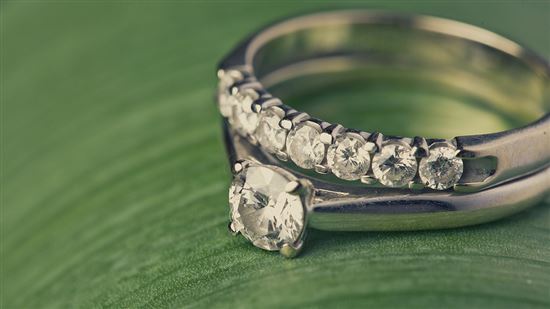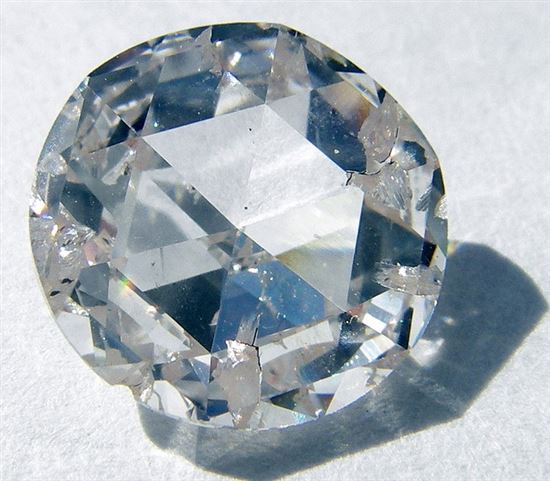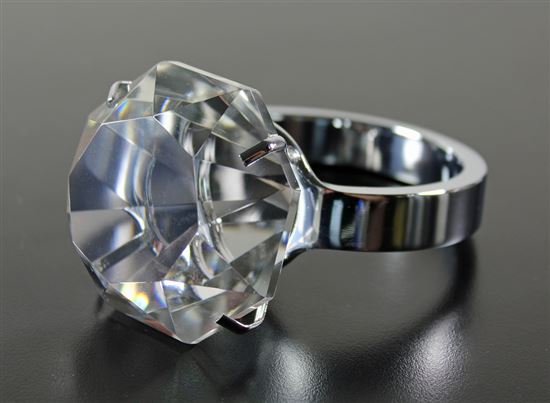23 Reasons Why Diamonds are Bad
Diamonds are supposed to be a girl's best friend, but it could be a conflicting relationship. Read on for 23 reasons to choose a different kind of stone if you're ready to put a ring on it.
If you need some convincing for steering clear of the beautiful stones—either because you're about to propose or you don't think you'll ever get one—we have the ammunition you need.
1. Diamond engagement rings are a marketing ploy
 |
| © Seth Lemmons (CC BY 2.0) via Flickr |
The idea that you have to have a diamond engagement ring to pop the question doesn't date back to any time-honored tradition.
The concept was popularized in the 20th century by De Beers, which coincidentally controlled 90% of the African diamond mining operations at one time.
2. Diamonds are more common than you think
 |
| © David Gardiner (CC BY 2.0) via Flickr |
One of the ways jewelers get people to shell out big bucks for diamonds is by making the claim that they're extremely rare. In fact, they're one of the most common gemstones found on earth.
3. They don't appreciate like other assets
Diamonds are often considered an investment of sorts, but you won't see a huge return on your money the way you would if you were buying a home or a piece of property. According to the Wall Street Journal, diamonds have increased in price over the last three decades but have lost half of their purchasing power due to inflation.
4. They're overpriced
There's an industry standard that says you should spend at least 2 to 3 months' salary on a diamond engagement ring—but you could be overpaying if you do. Research from the University of Manchester suggests that diamonds mined in Africa are sold at a considerable markup to consumers.
5. Synthetic diamonds are superior in some ways
 |
| © Steve Jurvetson (CC BY 2.0) via Flickr |
Lab-created diamonds have all the sparkle without the high cost. Synthetic stones are typically 20% to 30% cheaper than a diamond that's been mined, and they have the same chemical and physical qualities as the real thing.
6. Their quality is often exaggerated
Diamond quality is graded based on the 4 C's (cut, clarity, color and carats), but you can't take what a jeweler tells you at face value. In 2014, the European Gemological Laboratory was accused of misrepresenting quality and over-grading the diamonds it handled.
7. A pricey diamond can spell doom for your marriage
 |
| © Jeffrey Beall (CC BY-SA 2.0) via Flickr |
Spending thousands of dollars on a diamond doesn't guarantee that you and your sweetheart will enjoy wedded bliss.
In fact, a study from Emory University suggests that the cheaper the engagement ring, the happier the marriage overall.
8. You can't be absolutely certain where it comes from
While they're beautiful when held up to the light, the stories behind many diamonds are terribly ugly. Companies have implemented changes for so-called "responsible sourcing" to reassure buyers that their diamonds haven't contributed to ruining someone's life in a diamond-mining country, but the fact is, it's difficult (actually nearly impossible, according to this Time article) for everyday consumers to know for sure that the diamond they buy is "clean."
9. The demand can encourage unhealthy, unwise behavior
A substantial amount of the diamonds mined in Africa are unregistered, which makes them ripe targets for smugglers — some of whom are desperate. In 2012, South African police arrested a man who swallowed $2.25 million in diamonds in an attempt to smuggle them out of the country.
10. Some mining communities don't feel the financial benefits
The University of Manchester study mentioned earlier also investigated the amount of tax paid by De Beers in those South African localities where its diamonds are sourced. Researchers concluded that the industry as a whole may be substantially shortchanging countries that are responsible for the bulk of the diamond mining trade.
11. Many diamonds are produced using slave labor
Diamond mining involves backbreaking work, and slaves are used for the task in many countries. Both Angola and Sierra Leone, for example, are known to use enforced labor to mine diamonds.
12. Children aren't spared
Slave labor in the diamond mining industry isn't limited to adults. Children are also put to work mining and polishing the stones in countries like Liberia and Zimbabwe as well as parts of India.
13. Mine workers are underpaid
Workers who enter into the diamond trade of their own free will don't necessarily get a big payoff at the end of the day. The minimum wage for diamond workers in Zimbabwe is just $227 per month.
14. Many live in poor conditions
Aside from earning meager wagers, diamond miners often go without access to adequate health care or insurance. Basic necessities like clean water or plumbing are also in short supply at mining camps.
15. Physical abuse is common
Violence, a frequent occurrence in diamond mining camps, is often the result of workers refusing to or being unable to pay bribes to soldiers. An April 2015 article in the Daily Mail detailed several incidents involving beatings and torture of miners in Angola.
16. STDs are more common among diamond workers
Sex trafficking is major contributing factor to the high rates of HIV and other sexually transmitted diseases in and around diamond mining camps. In one study of male diamond workers in Surat, India, approximately 10% of participants reported at least one sexually transmitted infection.
17. Diamond miners face other health risks
Working in a diamond mine entails other dangers beyond the possibility of contracting HIV. One study of South African workers found a link between diamond mining and increased risk for developing asbestos-related respiratory diseases.
18. Diamonds contribute to civil conflict
The concept of "blood diamonds" was popularized in a 2006 Leonardo DiCaprio film, but the reality is much less glamorous than a Hollywood portrayal. Wars over diamonds in Angola, the Democratic Republic of the Congo, and Sierra Leone have cost 3.7 million people their lives, according to Amnesty International.
19. Corruption is widespread in diamond mining countries
Demand for diamonds continues to drive up their price and in some cases, it's the government that's cashing in. In 2012, it was reported that $2 billion worth of diamonds had been diverted into the pockets of Zimbabwe president Robert Mugabe and his inner circle.
20. Diamond mining is bad for the environment
The different processes used in mining diamonds have proven to be devastating for the environment. Diamond mining causes air and water pollution and is a major producer of greenhouse gases.
21. They may bring bad luck
There are lots of superstitions surrounding diamonds, including one that says removing or altering your engagement ring is bad luck. In India, black diamonds in particular are associated with doom and gloom.
22. Some are even cursed
The Hope Diamond is one of the best known diamonds in the world, but it's got a reputation for bringing harm to those who own it. One previous owner is believed to have been killed by a pack of wild dogs, while Louis XVI and Marie Antoinette, who may have owned the diamond at one time, famously went to the guillotine.
23. Diamonds aren't forever
Marketers would like us to believe that a diamond lasts forever, but researchers have proven them wrong. A 2011 study found that diamonds begin to deteriorate after being exposed to high levels of UV light.
Rebecca Lake is a journalist at CreditDonkey, a diamond jeweler comparison and reviews website. Write to Rebecca Lake at rebecca@creditdonkey.com. Follow us on Twitter and Facebook for our latest posts.
Note: This website is made possible through financial relationships with some of the products and services mentioned on this site. We may receive compensation if you shop through links in our content. You do not have to use our links, but you help support CreditDonkey if you do.
|
|
|









